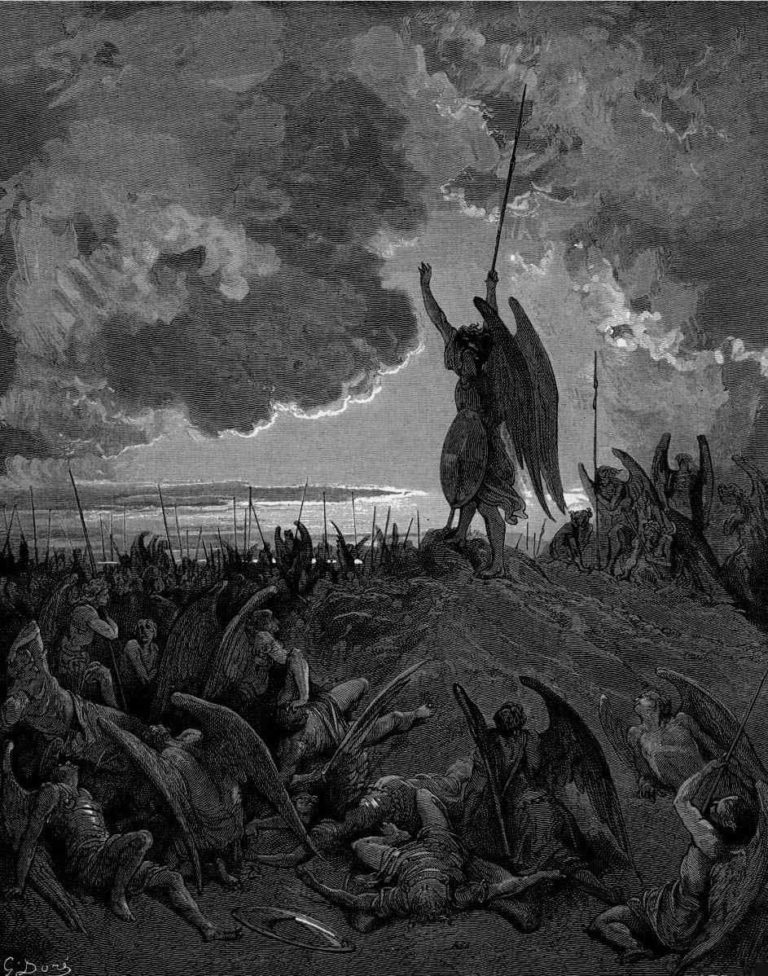Tuesday
A Weekly Standard article recently pointed out that 2017 was the 350th anniversary of Paradise Lost’s publication, which I should have noted given how often I teach it. Milton’s first-hand encounter with tumultuous times may help explain why his epic remains relevant and why it “has been translated more frequently in the last 30 years than it was in the preceding 300, mostly into non-Western languages.”
Among other things, Paradise Lost captures how a charismatic and unscrupulous leader can bend people to his will. Like America’s president, Satan speaks to his followers’ sense of loss, exacerbates their feelings of grievance, and feeds them fantasies of revenge. Milton scholar Michael Mattix explains Satan’s effectiveness:
Notwithstanding Milton’s famous promise in the opening section of the poem to “assert eternal providence / And justify the ways of God to men,” it is Satan’s poem from beginning to end. He is the first character to speak, and he is eloquent, bold, full of feeling for others. His first words are ones of consolation for his fellow fallen angel Beelzebub: “O how fall’n! how changed / From him who in the happy realms of light / Clothed with transcendent brightness didst outshine / Myriads, though bright!” He follows this with a word of encouragement: “All is not lost: th’unconquerable will / And study of revenge, immortal hate / And courage never to submit or yield— / And what is else not to be overcome?” He promises the other demons that he will never yield to God’s tyranny and tells Sin, with whom he had relations after she burst from his head Athena-like, that he will set her and her son free from “this dark and dismal house of pain” and, like a loving husband and father (at least until the mask slips), provide a home where “ye shall be fed and filled / Immeasurably: all things shall be your prey!”
Citing another scholar’s observation that Satan is “the first literary terrorist,” Mattix describes how he strokes a crowd to further his own interests:
In short, Satan says all the rightly compassionate things only to the “right” people, who are, of course, his people, and only when his own interests are at stake. He is unflappable only in front of a crowd, courageous only when it is personally advantageous. He acts like a good leader, father, and husband—and even argues with nearly perfect reasoning that he is more morally upright than God himself—all while serving only himself. He is a god of unchecked liberty, and, therefore, in Milton’s view, a god of chaos and destruction.
In my own posts comparing Donald Trump to Satan (see below), I have labeled them both consummate narcissists. We saw further proof this past weekend when, confronted with incontrovertible evidence of Russian election meddling, our president could only focus on himself. Taking steps to protect the nation never crossed his mind. Mattix shows Satan craftily engineering the council in Hell so that he will get all the glory:
But like everything else that Satan does, the offer [for a volunteer to journey to Eden] is a façade. Unsurprisingly, no one volunteers after Satan’s bleak description of the “perilous attempt” and he quickly chooses to do it himself, thus showing himself of “highest worth” and solidifying his authority over his peers…
What happens next demonstrates Satan’s political savvy: he makes sure that no one can speak after he himself has stepped forward. Satan understands that potential rivals might go for cheap glory by volunteering late:
Thus saying rose
The Monarch, and prevented all reply,
Prudent, least from his resolution raised
Others among the chief might offer now
(Certain to be refused) what erst they fear’d;
And so refused might in opinion stand
His Rivals, winning cheap the high repute
Which he through hazard huge must earn…
Mannix also quotes archangel Michael warning Adam about the Tower of Babel, where people put themselves above God rather than submitting to His authority. In a democracy, presidents must submit to the authority of the American people, and they become usurpers if they set themselves up as rulers. In the following, think of “inordinate desires and upstart passions” as a thirst for power, “Reason” as the higher faculty that calls us to serve:
In book 12, after the archangel Michael tells Adam about the Tower of Babel, Adam laments that his progeny, following Satan’s example, will desire to raise themselves above their peers and assume “Authority usurped from God not giv’n.” Michael responds that political tyranny is the direct result of men neglecting to rule their own liberty with reason and using that liberty instead to pursue “upstart passions”:
Reason in man obscured or not obeyed
Immediately inordinate desires
And upstart passions catch the government
From reason and to servitude reduce
Man till then free.
Satan is ultimately defeated, but boy does he make people’s lives miserable before that happens.


